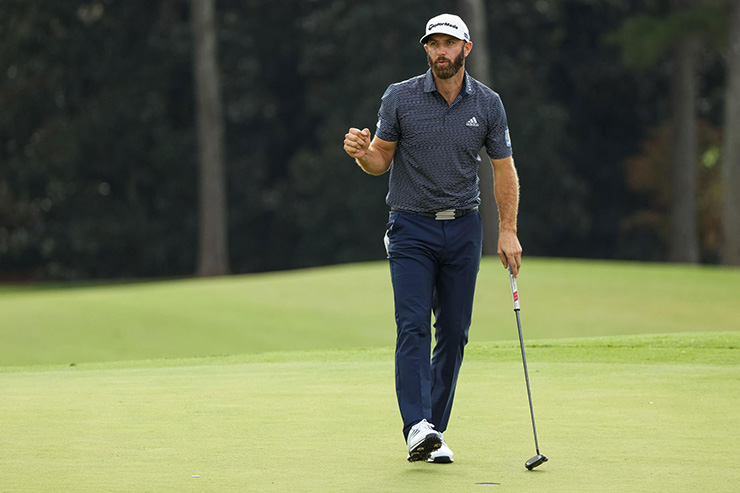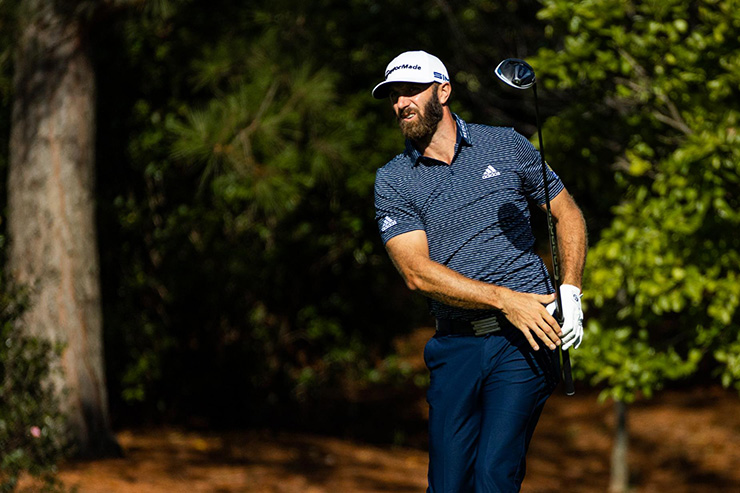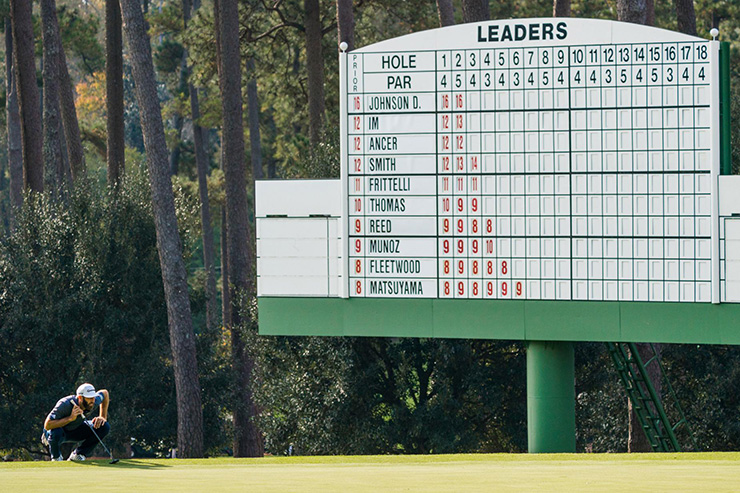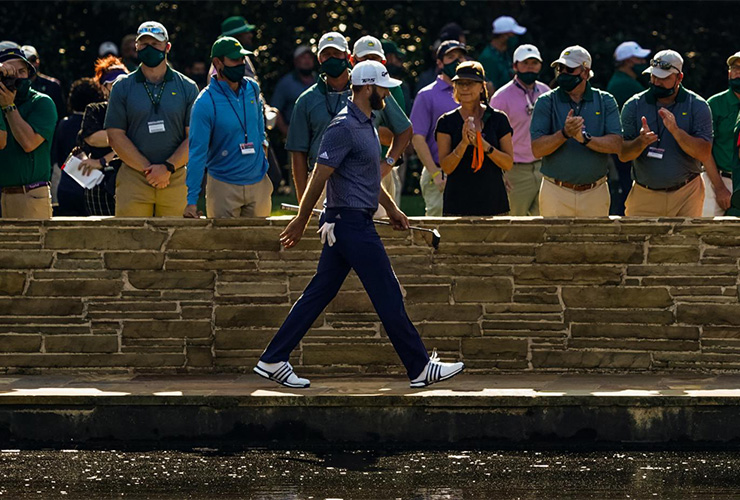By Joel Beall
The grounds crew had a problem. Someone woke the wind from a three-day slumber to let it know a Masters was afoot and it responded in kind, kissing Augusta National with breezes that rained pine needles across the property. Picturesque as this poetry-in-motion meeting of leaf and sky and land proved it be, it required the crew to continually blast the greens clear of debris. The workers moved as fast as they could but Mother Nature did not abide, and binoculars were not needed to see this wear on players, their heads down and shoulders slumped, an already slow round now flashing red lights.
Save for Dustin Johnson. He remained upright and focused. Whatever the crews needed to do was fine. Hell, take your time, his posture seemed to say. He is undisturbed by his surroundings, beholden to an inner command only known to him. It is aspirational, and at times, an Achilles’ heel, but it is always consistent. So while others tried to their damndest to bend Augusta National to their will, Johnson maintained his easygoing vibe, a vibe that matched this mellow Masters and for that he leaves as its champ.
“It was a very difficult day, but I didn’t let it bother me,” Johnson said after a final-round 68, good enough for a tournament-record 20-under score. “Growing up so close to here, it’s always been a tournament that since I’ve been on tour, since I played my first Masters, it’s been the tournament I wanted to win the most.”
He did grow up close, an hour away in Columbia, S.C. But his triumph is more than a hometown tale. To understand why Johnson won and why it mattered, you must understand who he is.
RELATED: Dustin Johnson’s play in 2020 redefines his golf legacy
Dustin Johnson is golf’s gunslinger, a fusion of swagger and aplomb that, coupled with his 6-foot-4 frame, stoic gait and nonchalant disposition, evokes a character from the wild, wild West. In a sport increasingly dominated by power he is one of its strongest, with a touch around the greens and aggressiveness in approach to ensure said that muscle does not go to waste. When things are going good for Johnson, which is often, he can make this impossible game look impossibly easy. Alas, Johnson’s career has partially been defined not for what it is, but for what it is not, particularly at the majors.
There were missteps, yes; some in spectacular and self-inflicted fashion. There are just as many, if not more, near-misses that were short on drama, but are near-misses nevertheless. The knock-on Johnson, some asserted, was he could not rise to the moment, that the poise that worked so well at rank-and-file events needed giddy-up at the four championships that matter most. He did win the 2016 U.S. Open, but his talents seemed to beg for more major titles.
“They are all difficult to win. You know, it’s just hard to get it done in a major for some reason,” Johnson said.
However, at a tournament known for existing in a timeless plane, this Masters is unlike any other. Yes, professional golf, including two majors, have been contested since June without galleries, and they were not short on theatrics or pressure. But, in all due respect to those competitions, their DNA is not fused with their galleries and the roars they produce, making this Masters feel less like a Masters and more like a member-guest. That required a calibration many were unable to make.
Johnson? No calibration needed. The blinders never came down.
“I like the patrons. I think they bring a lot of excitement and a lot of, you know, they make the Masters, really,” Johnson said. “But I would say if I had to say one way or the other, probably made it a little easier to get it done today without having all the fans or however many thousands that are here. But for me, all the tournaments we’ve played this year and the ones that I’ve won, looking back to before when we had fans, I mean, I feel the same way, whether the fans are here or not.”
Besides, this was a different Johnson. An improved Johnson, flaunting a command of his game and himself over the past five months that has left competitors in awe. “I think he’s got one of the best attitudes toward the game of golf in the history of the game,” Rory McIlroy said on Friday. “I don’t know if I can compare him to anyone else, but the way he approaches the game is awesome.” Even about with COVID-19 could not slow him down, and he finished second at the Houston Open in his return from the virus. With a four-shot lead, Sunday seemed like fait accompli.

Photo by Ben Walton
Chalk it up to that advantage, or that this is the last tournament many in the field will play in 2020, but for the final round of a major, the range was unusually chatty Sunday morning. Jon Rahm and Tony Finau complained about mud balls. Zach Johnson and Jordan Spieth talked college football. A few snickered at Tommy Fleetwood’s outfit, which looked like a Where’s Waldo starter kit dipped in lavender. Johnson was not among the conversation. He set up next to Cameron Smith, one of the three tied at 12 under, four back of Johnson. Johnson’s mouth opened as if to say hello, but Smith was huddled over his ball so Johnson gave him the once-over, kept quiet and went to work. One by one the range depleted, the players making their way to the clubhouse and onto the first and 10th tees. Johnson was the last to enter under the Big Oak, because that’s the procession order for kings.
The course wasn’t empty this week, with a few hundred club members, parents, significant others and media dotting the emerald landscape. That gallery seemed to triple when Johnson strode to the tee, individuals coming from the cabins and clubhouse and materializing from the fog that blanketed the former nursery most of the morning. Johnson was joined by Masters rookies Sungaje Im and Abraham Ancer. “Ready to play some golf, gentlemen?” the starter crooned. The trio answered yes. In the background, the club’s staff, dressed in white jackets and black pants, stood at attention on the veranda like Marines. They knew history was about to be made.
All three got off the tee without incident, but Johnson’s competitors did not get far. In short order:
—Justin Thomas, in the group ahead and starting the day six back, needed an eagle at the par-5 second to bring some heat. What he got was bogey, ending his chances.
—Ancer carried himself with no desire to be an accessory. The course had other plans. He missed a birdie at the second and bogeyed four of the next five. He ultimately finished outside the top 10.
—Im birdied the second and third, and at one point was down just one. But a one-shot deficit after five turned into three after six and he never threatened again.
Thing was, Johnson gave them a window. Yes, Augusta National was no longer vulnerable, the greens finally drying out, a breeze no longer absent. But Johnson’s troubles were from Johnson and Johnson alone. He flubbed a chip into a greenside bunker at the second. Though he birdied the third, he chunked his tee shot at the par-3 fourth and was unable to get up and down. A wayward drive into a left bunker at the fifth forced Johnson to lay up; his third from 150 yards was true. His par attempt from five feet was not. Lead, down to one, and for the briefest of moments, all of Johnson’s past seemed very much present.
“It was a battle all day, just an internal battle with myself,” Johnson said, when asked if he thought of those ghosts. “I knew I had to play well if I wanted to win.”

Ben Walton
Walking off the green Johnson looked up at the scoreboard, shook his head and muttered, “All right, come on.” Not exactly a rendition of Al Pacino’s locker room speech from “Any Given Sunday,” but the pep talk Johnson needed. He rifled his approach at the par-3 sixth—with a back-right pin boasting a landing spot the size of a dinner table—to seven feet, and converted. With Im making a mess of things, the lead back to three.
After another wayward drive at the seventh (although he was able to make par thanks to a nifty bunker shot), Johnson finally unleashed his fury at the eighth, a drive that was one of the longest on the par 5 all week. He didn’t let it go to waste, hitting a shot from 245 yards that caused Augusta National member and future Hall of Fame quarterback Peyton Manning to exclaim, “Yeah, yeah, that’s pretty good.” (Someone give Manning a commentary gig ASAP.) Johnson would birdie the eighth and par the ninth to make the turn in 35.
RELATED: 15 Things You Need To Know About Dustin Johnson
It wasn’t the most flashy of nines, at least not the flamethrower performance his score conveys. It underlined, however, that Johnson’s game is more than wild cowboy. He benched bravado for precision, taking a surgical approach because that’s what the situation called for.
“I felt like I controlled myself very well. Controlled the golf ball very well in difficult conditions,” Johnson said. “I felt like the wind was really tricky. The course, the greens were a little bit faster. Felt like you really had to be careful around here today.”
One problem. Cam Smith. The Aussie was tougher to get rid of than sand in your shoes. He birdied the ninth to shoot 33, with a par on the 10th keeping him just two back. The issue was very much in doubt with eight holes to go.
That’s when Amen Corner, as it’s prone to do, decided this tournament. Smith, after a wait for the green to be cleared from the aforementioned pine needles, erred when he couldn’t, bailing out to the right on the 11th and failing to save par. Desperately needing a birdie at the 13th, his drive found Augusta National’s lush second cut, forcing a layup. His third from 50 yards was as pedestrian as a pro can do from that distance, leaving a downhill 22 feet. Smith’s head fell and his birdie did not. He knew.
“I thought I’d have a decent shot if I got to Dustin’s original score at the start of the day, 16 under,” said Smith, who became the first player to shoot in the 60s all four rounds at the Masters. “I knew I had to put the pressure on early. Got out of the gates pretty good and DJ was just too good at the end.”

JD Cuban
Behind him, Johnson, who seemed more entertained by the colour of the trees to the left of 11 than the leaf blowers ahead, also bailed out to the right. Unlike Smith, he got up and down, staying cool when anything less would be penalized, with his stride seemingly growing a few inches longer. “I think the up and down on 11 was probably one of the biggest up and downs for sure,” Johnson said. He safely played the 12th and 13th, laying up at the famed par 5. Only 15 feet was between Johnson and an unassailable lead. It was 15 feet Johnson finished. A muted fist pump. He knew.
So did Johnson’s fiancee, Paulina Gretzky. She is overly polite when watching competition. She is the first to clap for others when they do well. When it comes to Johnson, she is usually the last, waiting until everyone else claps to do so. “Don’t want to jinx him,” she said earlier in the day. But at the 13th, there was no wait, arms in air as Johnson’s birdie disappeared.
More cheers on the 14th and 15th as Johnson added two more birdies. With the lead up to five, the call was made; the tailor received the go ahead, 42 inches, long.
“I felt like I could breathe a little bit,” Johnson said. Those final three holes were ceremony, to the point that Johnson had to ask his brother Austin where he stood walking up the 18th. “I assumed I had the lead, but I didn’t know by how many. I mean, that was kind of my goal.”
RELATED: The 9 records Dustin Johnson broke or tied at Augusta National
Those back-to-back-to-back birdies were more than just birdies. Johnson is known as a savant for his ability to block out the things others couldn’t. But this skill is often mislabeled as a baseball closer’s mentality. It’s wrong because if any closer blew as many leads as Johnson has, well, they’d be looking for a new job.
This Sunday, at this Masters, that label fit. Johnson shut the door on Smith, this tournament, the whispers and what-ifs and stigma of “Should’ve Been.” Johnson has previously dismissed this talk, saying to him it’s just a game. He’s right; this year has been an unwelcome reminder that, in life’s bigger scheme, this is just a game. In that same breath, the always stoic Johnson had an emotional response Sunday night—brought to tears in a TV interview—showing that it’s okay to feel the way we feel about this tournament and sport.
“On the golf course, I’m pretty good at controlling my emotions, you know, because I’m out playing golf. But I had a tough time there speaking [to CBS Sports’ Amanda Balionis] on the putting green,” Johnson said. “Just because it, like I said, it means so much to me. It means so much to my family, Paulina, the kids. They know it’s something that I’ve always been dreaming about and it’s why I work so hard.
“You know, I put in a lot of work off the golf course, on the golf course, and I think it’s just, you know, it’s something that you push yourself for. That’s why I work so hard is to be in this position. To finally have the dream come true, I think that’s why you see all that emotion.”
He kept composed in the face of competition and charges, maintenance delays and past demons. But let the record show Dustin Johnson can be fazed. And in the most beautiful of fashions.









